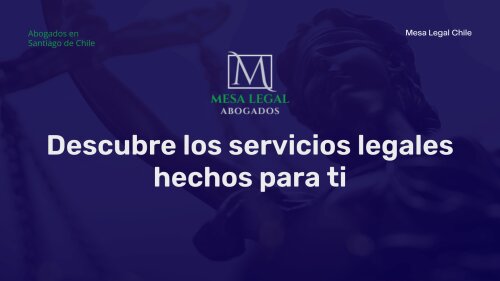Best Arrests & Searches Lawyers in Chile
Share your needs with us, get contacted by law firms.
Free. Takes 2 min.
Or refine your search by selecting a city:
List of the best lawyers in Chile
About Arrests & Searches Law in Chile:
Arrests & Searches in Chile are governed by the country's Criminal Procedure Code. This code outlines the rules and procedures that law enforcement must follow when arresting individuals or conducting searches. It is important to understand your rights in these situations to ensure that they are not violated.
Why You May Need a Lawyer:
You may need a lawyer in situations where you have been arrested or subjected to a search by the authorities. A lawyer can help ensure that your rights are protected and guide you through the legal process. They can also provide you with valuable advice on how to proceed and represent you in court if necessary.
Local Laws Overview:
In Chile, individuals can be arrested only with a warrant issued by a judge, with some exceptions in cases of flagrante delicto. Searches can be conducted with a warrant or in specific circumstances without one. It is important to know your rights during these procedures and how to assert them effectively.
Frequently Asked Questions:
1. Can the police arrest me without a warrant in Chile?
Yes, the police can arrest you without a warrant in Chile in cases of flagrante delicto or in other specific circumstances outlined in the law.
2. Do I have the right to refuse a search by the police?
You have the right to refuse a search by the police unless they have a warrant or there are specific circumstances allowing for a search without one.
3. What should I do if I am arrested in Chile?
If you are arrested in Chile, it is important to remain calm and assert your rights. Ask to speak to a lawyer and do not provide any statements until you have legal representation.
4. How long can the police detain me without charges in Chile?
The police can detain you for up to 24 hours without charges in Chile, after which a judge must review the case and decide on further detention or release.
5. Can the police conduct a search of my home without a warrant in Chile?
In Chile, the police can conduct a search of your home without a warrant in specific circumstances, such as in cases of flagrante delicto or to prevent imminent danger.
6. What are my rights during an arrest in Chile?
During an arrest in Chile, you have the right to remain silent, the right to legal representation, and the right to be informed of the reasons for your arrest.
7. Can I be searched at random by the police in Chile?
No, the police cannot search you at random in Chile. Searches must be based on reasonable suspicion or conducted in specific circumstances allowed by law.
8. Can I sue the police for wrongful arrest or search in Chile?
Yes, you can sue the police for wrongful arrest or search in Chile if your rights have been violated. A lawyer can help you determine the best course of action in such cases.
9. Can I be arrested for misdemeanors in Chile?
Yes, you can be arrested for misdemeanors in Chile if the offense falls under the criteria for arrest outlined in the law.
10. How can a lawyer help me with an arrest or search in Chile?
A lawyer can help you understand your rights, guide you through the legal process, represent you in court, and ensure that your rights are protected during an arrest or search in Chile.
Additional Resources:
If you need legal assistance with Arrests & Searches in Chile, you can contact the Chilean Bar Association or the National Institute of Human Rights for guidance and support.
Next Steps:
If you require legal assistance with Arrests & Searches in Chile, it is important to contact a qualified lawyer as soon as possible. They can provide you with the necessary guidance and representation to protect your rights and ensure a fair legal process.
Lawzana helps you find the best lawyers and law firms in Chile through a curated and pre-screened list of qualified legal professionals. Our platform offers rankings and detailed profiles of attorneys and law firms, allowing you to compare based on practice areas, including Arrests & Searches, experience, and client feedback.
Each profile includes a description of the firm's areas of practice, client reviews, team members and partners, year of establishment, spoken languages, office locations, contact information, social media presence, and any published articles or resources. Most firms on our platform speak English and are experienced in both local and international legal matters.
Get a quote from top-rated law firms in Chile — quickly, securely, and without unnecessary hassle.
Disclaimer:
The information provided on this page is for general informational purposes only and does not constitute legal advice. While we strive to ensure the accuracy and relevance of the content, legal information may change over time, and interpretations of the law can vary. You should always consult with a qualified legal professional for advice specific to your situation.
We disclaim all liability for actions taken or not taken based on the content of this page. If you believe any information is incorrect or outdated, please contact us, and we will review and update it where appropriate.
Browse arrests & searches law firms by city in Chile
Refine your search by selecting a city.

















